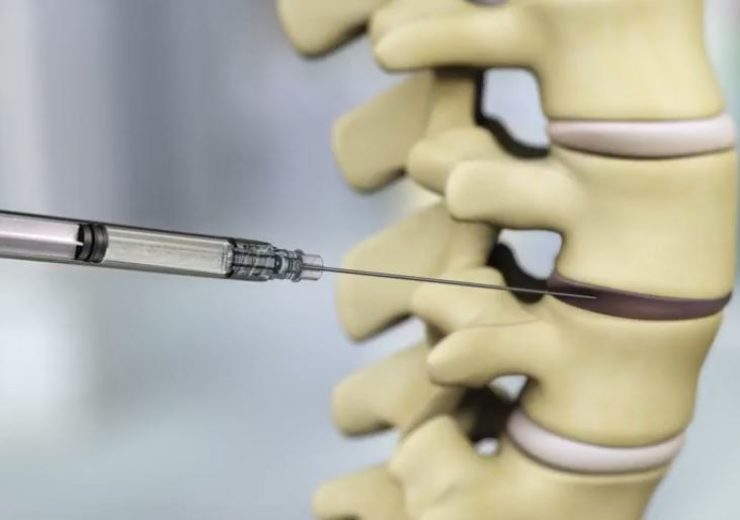The IDCT trial is a prospective, randomised, double-blinded, vehicle- and placebo-controlled, multicentre clinical study aimed at evaluating the safety and preliminary efficacy of IDCT

Image: During treatment, a single dose of IDCT is injected into the painful disc percutaneously.. Photo: Courtesy of DiscGenics, Inc.
US-based clinical-stage biopharmaceutical company DiscGenics has secured approval from an independent data safety monitoring committee (DSMC) to start the US clinical study of injectable disc cell therapy (IDCT).
DiscGenics develops regenerative cell-based therapies for patients with degenerative diseases of the spine, and it intends to enrol 24 patients with mild to moderate degenerative disc disease (DDD) for its first-in-human IDCT clinical study.
DiscGenics chief executive officer and Board of Directors chairman Flagg Flanagan said: “We are delighted to commence the final enrollment stage in our U.S. study of IDCT for DDD and are thrilled that the first 36 patients have now been safely treated. This is a blinded, first-in-human study where neither the treating clinicians nor the patients know what treatment is being administered.
“As a result, performance of periodic safety checks by an unblinded and independent body was essential to ensuring the ongoing safety of IDCT in a clinical setting. The members of the DSMC played a critical role in this process and we would like to sincerely thank them for their time and thoughtful review of the blinded safety data.”
DiscGenics secured FDA Fast Track designation for IDCT
The IDCT trial is a prospective, randomised, double-blinded, vehicle- and placebo-controlled, multicentre clinical study aimed at evaluating the safety and preliminary efficacy of IDCT in subjects with single-level, symptomatic lumbar intervertebral disc degeneration.
DiscGenics said that 60 subjects who meet all eligibility criteria will be enrolled into the ongoing clinical trial in 14 centres across 12 states in the US.
Under the study, the enrolled subjects will be randomised into four treatment cohorts: low dose IDCT, high dose IDCT, vehicle and placebo. The subjects will be administered a single intradiscal injection of assigned treatment into the target symptomatic lumbar intervertebral disc.
In addition, the subjects will be observed and evaluated for one year after treatment, which can be extended to one more year.
Safety and reduction in pain are the primary outcome measures, while reduction in disability and radiographic improvement are the secondary outcome measures for the clinical study.
DiscGenics said that the study will evaluate IDCT under an investigational new drug (IND) allowance by the US Food and Drug Administration (FDA) and regulated through a therapeutics biologics license application (BLA) as a drug-biologic.
